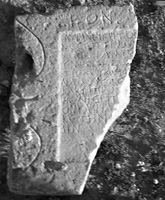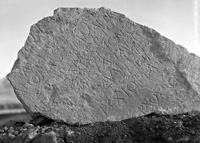 MAMA XI 271 (Laodikeia)
MAMA XI 271 (Laodikeia) 
Funerary inscription of Aur. Aneiketos
- Type of monument:
- Funerary inscription.
- Location:
- Ladık (Laodikeia): at Gâvur Mezarı, above Kör Kuyu, 500m above the village on the slope of a hill, facing east; at the ruins of a church, with MAMA XI 263 (1957/109).
- Description:
- Grey marble slab, broken in two parts, which join only at the top. Inscription in inset panel, within tabula ansata.
- Dimensions:
- Ht. 0.74; W. 0.61; Th. 0.25; letters 0.025-0.030.
- Record:
- AH notebook copy; photographs (1957/116=5948-9).
- Publication:
- None.
- Date:
- Third or fourth century AD.
Αὐρ(ήλιος) Ἀνείκητος | Παύλου πολείτ̣[ης]
κὲ Σεπτιμί|α Πονπωνία Μάγνα [ἅ]-
μα τῷ γλυκυτά̣|τῳ ἡμῶν οἱειῷ Δ̣[ι]-
υνεσίῳ ζῶ|ν̣τ[ες] τὸ μνημῖον κα-
5τισκευάσα[μεν· εἴ τις] μ̣ετὰ τὰ ἔγο-
νά μου ἕτε[ρον ἐπεν]βάλι ἢ χῖρα
κακὴν προσ[οίσει τού]τ̣ῳ τῷ μνιμίῳ,
ἠσχήσι π[ρὸς τὸ]ν βραχίονα τ-
ὸν ὑψηλ[ὸν vac. ] vac.
10κὲ τὴν κ̣[ρίσιν τὴν] ἐρχομέν-
ην vac.
Aur(elius) Aneiketos, son of Paulos, curialis, and Septimia Pomponia Magna, along with our sweetest son Dionysios, we constructed the memorial while we were still living. If anyone inters another after my descendants or lays a wicked hand on this memorial, he shall have to reckon with the outstretched arm and the coming judgement.





Throughout the east Roman world in late antiquity, curial status was frequently indicated by means of the participle πολιτευόμενος or πολιτευσάμενος: see Robert, OMS VI, 5-6; Laniado 2002: 75-87; Brandes and Haldon 2000: 169-70, n.110; for examples at Laodikeia, see MAMA I 280 (Kadınhanı), Αἴλ. Εὐγένιος Νέστ[ορος] πολιτευόμ(ενος)... Ἰουλ. Ἑρενί(ῳ) Ἀνδροκλίῳ πολ[ιτευ]σαμ(ένῳ); MAMA VII 89 (Soğukpınar), Ελ[- -] διος Γ̣ε̣ν̣[ε]θλίου πολ(ιτευόμενος); MAMA I 284 (Ladık): ὄντα γένους βουλ[ευτικοῦ] τ̣ὰ πρῶτα πολειτευσάμ̣[ενον]. In line 1 of this inscription, the noun πολείτ̣[ης] appears similarly to be indicating curial status. The noun is considerably less common than the participle in this sense, but two clear parallels are known at Laodikeia: MAMA I 60a (Φλ. Λυτατιανὸς Ἀλεξάνδρου πολίτης); MAMA I 60 (Αὐρ. Ἡράκλιος Θ[εο]δοσίου πολίτης, rather than Calder’s Θ[εο]δοσιουπολίτης); cf. apparently Sterrett 1888a: 209, no. 226 (Konya): Αἴλ. Πανχάριος [- - -] ου πολίτης. For the usage πολίτης = curialis, cf. perhaps CJ XI 1.1.3; XII 37.19.1b (emended in both instances to πολιτευόμενος by Laniado 2002: 98, 107-8). The verb πολιτεύεσθαι was also used by the Novatian community at Laodikeia, apparently in the sense of ‘hold ecclesiastical office’: see MAMA I 172 (Kadınhanı), Λεύκιος ἀνέσθησα τῷ γλυκυτάτῳ μου πατρὶ Ἀβρα τῷ εὐλαβεστάτῳ πρεσβιθέρῳ θῆς τοῦ θεοῦ ἁγίας ἐκλησίας τῶν Ναυατῶν, ἐν ᾗ κὲ ἐπολιθεύσατο; MAMA VII 79 (Kındıras), Αὐρη. Πῶλα κανον⟨ι⟩κὴ καλῶς πολιτευσαμένη ἐν τῇ ἁγ̣ιωτάτῃ ἐκλησίᾳ τοῦ θεο[ῦ]. Cf. also MAMA XI 288 (1956/135).
For ἅμα in the sense of σύν at Laodikeia (lines 2-3), cf. MAMA I 203 (Αὐρ. Δόμνα Γελασίου ἅμα τῷ υἱῷ μου Μενάνδρῳ ἀνέστησα τῷ ἀνδρί μου κτλ.); MAMA VII 74 (Αὐρ. Γεννάδιος... ἅμα τῆς συμβίου Θέκλης ἀνεστήσαμεν τὸν τίθλον τοῦτον); MAMA I 60 (Αὐρ. Ἡράκλιος... κατεσκεύασα τὰ πέ[λτα] ἅμα τῇ γλυκυτάτῃ μ[ου] συμβίῳ Αὐρ. Ζηνων[ίδι] ζῶντες ἑαυτ[οῖς]); MAMA I 81; MAMA VII 69.
The curse in lines 8-11 is a variant on the common Laodikeian curse-formula, informing a putative tomb-robber that he ‘will have to reckon with God’ (ἕξει πρὸς τὸν Θεόν): see Robert, Hellenica XI/XII, 401-4; Strubbe 1991: 35. As with the similar ‘Eumeneian formula’ (for which see the commentary to MAMA XI 36 [1954/14]), the inscriptions concerned are probably predominantly Christian, although a Jewish origin cannot be ruled out (Robert, Hellenica XI/XII, 398-413; Strubbe 1994: 83-100). The ‘outstretched arm’ (τὸν βραχίονα τὸν ὑψηλόν) with which the tomb-robber is threatened in lines 8-9 recalls the expression ‘with a strong hand and an outstretched arm’ (ἐν χειρὶ κραταιᾷ καὶ ἐν βραχίονι ὑψηλῷ), which occurs, with variations, some 33 times in the Septuagint, almost always with reference to the exodus from Egypt (Martens 2001); at Acts 13:17, Paul reminds the Jews of Pisidian Antioch how God brought them out of Egypt ‘with an outstretched arm’ (μετὰ βραχίονος ὑψηλοῦ). Given that the tomb-robber is here specifically threatened with ‘the outstretched arm and the coming judgement’ (lines 8-11), it seems possible that the author of the inscription had in mind Exodus 6:6, where God says to Moses ‘I shall redeem you with an outstretched arm and a mighty judgement’ (λυτρώσομαι ὑμᾶς ἐν βραχίονι ὑψηλῷ καὶ κρίσει μεγάλῃ). I know no epigraphic parallel for the quotation of this particular Biblical phrase; compare, however, MAMA VI 231 (Apameia), where the wrongdoer has to reckon with the hand of God (ἔσται αὐτῷ πρὸς τὴν χεῖρα τοῦ Θεοῦ). The second part of the curse in lines 10-11 (κὲ τὴν κ̣[ρίσιν τὴν] ἐρχομένην, ‘and the coming judgement’) is precisely paralleled in inscriptions from Soloi on Cyprus (Robert, Hellenica XI/XII, 403, no. 14: ἔχ[ε]ι πρὸς τὴν μέλλυσα[ν] κρείσιν) and from Jerusalem (Robert, Hellenica XI/XII, 403-4, no. 16: ἔχει πρὸς τὴν [κρίσιν τὴν μέ]λλουσαν); a fragmentary funerary inscription from Athens may well have contained a similar curse (IG II2 13563, ...τὸ μέλλον κριτήριον). Compare also the curse-formula in a near-contemporary inscription from Laodikeia, MAMA XI 274 (1957/108: Ladık), δώσι λόγον τῷ Κυρίῳ ἐν ἡμέρᾳ κρίσεως.